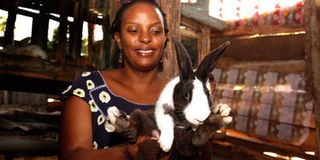Mugisha is harvesting money from rabbit urine

Joanna Haba Mugisha. Photo by Rachel mabala
What you need to know:
INNOVATION: Jackson and Haba Mugisha harvest rabbit urine before adding value to it to create distinct urine manure, writes EMMANUEL AINEBYOONA
A family based in Kyanja, a Kampala suburb, has embarked on rearing rabbits on a large scale to harvest their urine and make organic manure.
The idea came from the most unexpected of places- a You Tube video. One day as Jackson Mugisha was flipping through his YouTube clips; he found one about a Kenyan famer who was making a lot of money from selling fermented rabbit urine manure.
While the story was intriguing then, it was not until a year later while listening to an agricultural show that Mugisha made up his mind to venture into the enterprise.
Starting
“I looked for the contact of one the farmers who were talking about keeping rabbits and asked him for more details on where I could find rabbits to rear.,” says Mugisha. His first attempt however was met by disappointment.
“I started with 26 rabbits but because it was my first time I was cheated by the one who sold them to me. Each rabbit costs Shs100, 000. It was until when 1O rabbits died that I got another person who sold me each rabbit at Shs50, 000,” Mugisha says.
He says rabbits are delicate animals that need special care.
Mugisha started with about Shs7.5m as initial investment..
Out of which about Shs2.6m was spent on buying the rabbits, 2.5 mon building the cages and another Shs1.7m for the water bottles.
He employs two full-time workers on his farm who are responsible for feeding the animals. Both workers are paid Shs200, 000 monthly.
Mugisha now has 350 rabbits which produce more than 30 litres of urine every day.
Process
The rabbits are kept in wooden framed cages with wire mesh around them to allow proper ventilation. Beneath the cages, lies sloping iron sheets projected into a gutter that enables collection of urine needed for manure.
At everyone time, the urine is seen dripping into a basin at the catchment area.
His wife Joanna Haba says after harvesting, the urine is fermented for three to four weeks.
At the farm, the rabbits were seen sucking water from drinking bottles which she says are very safe and hygienic.
“We import the bottles at $3 (Shs10, 000) each,” Haba said.
She says that the rabbits require a lot of drinking water if they are to produce large quantities of urine.
Mugisha says that fermented rabbit urine contains nutrients needed for manure which supports vegetable and fruit growth.
Working with an agricultural extension worker, Mugisha says there has been a process of value addition to come up with organic manure known as Orgamax.
Patrick Kawere, who has done research on rabbit urine as manure, says the Orgamax contains high levels of fertiliser components like NPK. “Orgamax is a foliar fertiliser used as a plant growth regulator,” Kawere says.
He revealed that rabbit urine is put in a 20 -litre jerry can, then mixed with 500millitres of molasses, 24omls of EM4 (Bacterial decomposition) and 100grammes in one litre of water corn starch mixture which helps feed the micro-organisms.
Kawere adds that laboratory tests are underway at National Agricultural Research Laboratories (NARL-Kawanda) to ascertain the exact amounts.
Packaging
The fermented rabbit urine is packaged in one litre bottles and sold at a price of Shs15, 000 each.
His wife says that the rabbit droppings are also processed to make manure which is sold separately alongside the fermented rabbit urine.
After laboratory approvals, the family plans to open up a Fertiliser shop at Container Village in Kampala. Challenges
However, Haba says lack of water for the rabbits in the area where the farm is located remains a major challenge. She also cited snakes as that keep sneaking into the cage to kill some rabbits as a challenge.
Plans
The family’s future vision is to own a fast food restaurant in Kampala which sells only products got out of rabbit meat.
“Beyond rearing rabbits for urine, I would like to keep them for meat ,” Mugisha says.
Common rabbit types to rear
New Zealand whites:
This is one of the most common rabbit breed used for meat.
Californian rabbits:
These were developed by crossing of Chinchilla and New Zealand Whites.
The American Chinchilla:
This is one of the best rabbits for meat and looks very much like a Chinchilla.They are preferred best for roasting and barbeque.
Silver foxes:
These are great homestead rabbit and also fall in the fancy category and for producing meat.
Champagne D Argent:
This historic yet attractive Rabbit has been used for meat since 1631. Cinnamons Rabbits:
This is a cross breed between the New Zealand White and American Chinchilla.
Flemish giants:
As the name suggests, these rabbits are giant in their size and may above 15 kilogrammes.
Rex Rabbits:
These soft and plush rabbits were developed for the purpose of fur and meat.




